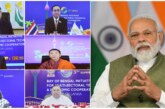Water is the most vital component essential for human life and all other forms life on earth. Access to safe water is a basic human necessity. As such, each individual should have the right to accessible, affordable water in quantity and quality sufficient to life and basic economic activities. Apart from its health and environmental value, water has acquired cultural significance as well. Supply of clean and drinkable water is globally a shared legacy, a public trust and a basic human requirement.
Water is a natural resource that calls for its judicious use. It needs to be preserved for the common good of all peoples and ecosystems on this planet earth. Balances and healthy ecosystems can be helpful in ensuring the human right to water for future generations.
Water is increasingly becoming scarce natural resource. Currently 1.4 billion people lack access to clean drinking water and by 2025 some 3 billion people will be suffering from water shortage. Ironically, over 80 per cent of these people live in developing countries, predominantly in rural areas and in areas of marginal habitation in and around large cities.
About ten thousand people daily due to diseases caused by a lack of clean water and sanitation. These persons are left with no other option but to consume water brought from unsafe sources such as unprotected wells, ditches, rivers or lakes. Inadequate sanitary facilities force most the people to defecate in buckets, plastic bags and public places in and around their communities. Apart from paucity of financial resources, other issues like discrimination; failure to involve communities in decision-making; and/or a lack of political will to implement plans and extend water and sanitation supply to deprived urban and rural areas etc., are the main causes of such a sordid state of affairs afflicting water sector in developing countries, including India.
Until recently, water and sanitation was perceived as a purely development or technical issue, with the legal and political dimensions underplayed. As rightly emphasized in the UNDP Human Development Report 2006, lack of access to basic levels of water and sanitation is primarily attributed to exclusion and neglect of the poor and not, as commonly assumed, lack of sufficient water resources or lack of technical solutions.
Need for Right to Water
Recent research has shown that lack of proper water resources or inadequate technical facilities are not solely responsible for the dismal state of affairs pervading water sector, but it is mainly due to exclusion and neglect of the people in the management of water affairs. In other words, it is more of an issue of water governance. This requires the urgency to make right to water as a fundamental right.
Undoubtedly, proper implementation of the right to water and sanitation in national and international governance frameworks can be helpful in generating the political will essential for making the necessary reforms to laws, policies and practices. This will also help in mobilizing necessary resources, both at domestic and international levels, for basic water and sanitation. It can also help in ensuring that all relevant resources are harnessed properly in a manner that exerts specific emphasis on the needs and aspirations of the poor and marginalized people.
At this critical juncture, there is a dire need to make right to water as a fundamental right because such a move would envisage improved accountability. In other words, the right to water means that access to water is viewed as a legal entitlement, rather than only a moral priority. National mechanisms, such as human rights commissions and courts, and international human rights mechanisms can identify and address deficiencies in the implementation of water policies, and recommend or require improvements.
The issue of right to water can help various communities and other organizations to raise the political profile of the importance of access to water and sanitation and can lobby the responsible agencies for improvements.
The right to water focuses attention on groups that have been traditionally discriminated against or historically neglected, such as persons living in informal settlements. It obliges governments to use available resources in a manner that prioritizes the extension of access to basic water and sanitation services to all their people. This is in contrast to common practice where significant amounts of public resources are often used for the construction of infrastructure and provision of subsidies that benefit upper and middle-income groups to the exclusion of the poor.
Besides, the right to water facilitates increased participation of the people in decision-making. It provides for genuine consultation and participation of communities in decision-making on service delivery and management of water resources. Although participation is now acknowledged as a development best practice, centralized planning processes remain prevalent, and can neglect the input of various users. The right to water and sanitation can help empower and enable communities to organize themselves and legitimately seek to take part in decision-making processes.
Current International Status adequate?
Various international treaties, including the Convention on the Rights of the Child and the Convention on the Elimination of All Forms of Discrimination Against Women include commitments related to access to water. Several United Nations organs have recognized the right to water and sanitation. The UN General Assembly stated that the right to clean water is a fundamental human right. The Human Rights Commission adopted several resolutions on toxic wastes, which referred to the ‘right to water.’
The right to water as a component of the right to an adequate standard of living was referenced in the Programme of Action of the 1994 Cairo Conference on Population and Development. Other bodies besides the United Nations have made similar declarations. The 116 member States of the Non-Aligned Movement recalled General Comment 15 and acknowledged the right to water in 2006. The 43 Governments represented in the Council of Europe stated in 2001 that international human rights instruments include the right to a minimum quantity of water of satisfactory quality from the point of view of health and hygiene. As a result, every UN member State has at least once recognized the right to water.
Acknowledgment of the right to water is a useful resource for governments and civil society. However, mere recognition of right to water in international treaties is not enough and United Nations’ treaties and declarations in this regard are insufficient to bring about real change. Therefore, it is essential to support words with actions, and to mobilize the expertise and independence of United Nations human rights bodies in support of implementation.
Presently, there is no Special Rapporteur on water and sanitation. The UN Special Rapporteurs on food, health, education and housing have tried to fill this gap by giving some attention to water and sanitation in the course of their work. However, as their core issues of food, health, education and housing have such a degree of breadth and complexity, existing Special Rapporteurs have been unable to address water and sanitation in any comprehensive or sustained manner. Similarly, the Office of the High Commissioner for Human Rights (OHCHR) lacks sufficient means to provide technical assistance to governments in relation to water and sanitation.
It is a happy augury that one of the first decisions of the UN Human Rights Council, taken in November 2006, was to request the OHCHR to carry out a study on human rights obligations related to access to safe drinking water.
OHCHR study in its report of August 2007 concludes that “it is now time to consider access to safe drinking water and sanitation as a human right” and calls upon States to prioritize personal and domestic water uses over other uses and to take steps to ensure that a sufficient amount of good quality water for personal and domestic uses is affordable for all and can be collected within a reasonable distance from a person’s home.
While noting that UN special procedures and treaty bodies have made a contribution to clarifying human rights obligations regarding access to drinking water and sanitation, the report finds that “specific, dedicated and sustained attention to safe drinking water and sanitation is currently lacking at the international level, given the broad range of issues that special procedures and treaty bodies have to address within their mandate and the specific questions that arise in relation to access to safe drinking water and sanitation.”
The OHCHR encourages the Human Rights Council to continue its consideration of human rights obligations in relation to access to safe drinking water and sanitation and encourages States and other actors to identify good practices regarding safe drinking water and sanitation and make them available to OHCHR.
Some of the countries like United Kingdom, the Netherlands, South Africa, many States in the United States have adopted right to water for their people, keeping in consonance with the international treaties and conventions in this regard. India is yet to follow suit.
Right to Water in India
Until recently, access to water as a right was almost a neglected field in India. However, the positive impact of the international declarations, active role by the civil society groups and judicial interventions by the Supreme Court and several High Courts created a favourable atmosphere for considering access to drinking water a right in India. As per Fundamental Rights enshrined in the Constitution of India, Article 21 entitled ‘protection of life and personal liberty’ states: ‘no person shall be deprived of his life or personal liberty except according to procedure established by law.’ This has popularly come to be known as Article on ‘right to life’.
In the wake of new problems of citizens’ rights and welfare and the role of the State coming up before the judiciary over the years, the scope of the right to life has considerably widened. As is rightly observed, the Supreme Court breathed life into the words of Article 21 (personal life and liberty) as ‘life with human dignity, with all faculties intact.’ The scope of this concept has got widened in course of time to incorporate various other significant aspects of human life like ‘pollution free water and air for full enjoyment of life’, health, environment, housing etc. Public interest litigations played a significant role in this process.
In view of the scope of this right, environmental, ecological, air and water pollution etc., are regarded as amounting to violation of Article 21. Further, ‘the entitlement of citizens to receive safe drinking water (potable water) is part of the right to life under Article 21.’ As early as in 1984, the Supreme Court in Bandhua Mukti Morcha vs. Union of India case developed the concept of right to ‘healthy environment’ as part of the ‘right to life’ under Article 21. The Court, in a judgement on 1 December 2000, had observed that ‘in today’s emerging jurisprudence, environmental rights which encompass a group of collective rights are described as “third generation” rights’. The rights found in the International Convention on Civil and Political Rights and International Covenant on Economic, Social and Cultural Rights are considered as the ‘first generation’ and ‘second generation’ rights respectively.
The apex Court reiterated again that ‘the right to access to clean drinking water is fundamental to life and there is a duty on the state under Article 21 to provide clean drinking water to its citizens’. The State is duty bound not only to provide adequate drinking water but also to protect water sources from pollution and encroachment. Any act of the State that allows pollution of a water body ‘must be treated as arbitrary and contrary to public interest and in violation of the right to clean water under Article 21’.
Even prior to this judgment, the Supreme Court as well as several High Courts in States in India upheld the citizens’ right to have access to clean drinking water as a fundamental right as per Article 21. The Supreme Court in Subhash Kumar v State of Bihar (1991) held that the right to live ‘includes the right of enjoyment of pollution-free water and air for full enjoyment of life. If anything endangers or impairs that quality of life in derogation of laws, a citizen has right to have recourse to Article 32 of the Constitution for removing the pollution of water or air which may be detrimental to the quality of life’.
In M.C. Mehta v Kamalnath (1997) the Supreme Court categorically ruled that the State is not only bound to regulate water supply, but should also help realize the right to healthy water and prevent health hazards. The principle of Roman Law ‘salus populi est suprema lex‘ (welfare of the people is paramount law) is the abiding preambular faith in Indian Constitution and the ‘State is assigned a positive role to help people realize their rights and needs’. The apex Court in State of Karnataka v State of Andhra Pradesh (2000) held that the right to water is a right to life, and thus a fundamental right.
In Narmada Bachao Andolan v Union of India (2000) it was held that ‘water is the basic need for the survival of human beings and is part of the right to life and human rights’. While alluding to several of the rulings of the Supreme Court, the A.P. High Court reiterated the responsibility of the State in providing clean drinking water to the citizens in P. R. Subhash Chandran v Government of Andhra Pradesh & Others (2001).
Thus, in the Indian Constitution, providing every citizen with adequate clean drinking water and protecting water from getting polluted is a fundamental Directive Principle in the governance of the State as well as a penumbral right under Article 21.
Conclusion
It is saddening that the inadequate or denial of access to drinking water to the majority of the people in India has been going on for a long time. And this has been happening despite the Supreme Court’s various rulings from time to time that access to clean drinking water is a fundamental right as part of right to life in Article 21 of the Indian Constitution. This shows apathy of the government, both at the Central and State levels.
The government seems to have succumbed to the pressure tactics of the vested interests who are eager to make profits by commodifying water, thereby denying access to drinking water to the poor and marginalized segments of the society. While pursuing liberalization polices in different sectors of economy, the water sector should be properly looked after as an area of public service where profit should not be the sole criterion.
While allowing public-private partnership in water sector, the emphasis should be on safeguarding the interests of the vast majority of the masses by ensuring adequate supply of drinking water to them and the private sector can be compensated in other areas for their investment and loss in this sector. All this requires legal framework which can come into existence only when Right to Water is included into the existing Fundamental Rights by amending the Constitution.
By Dr. Arvind Kumar



